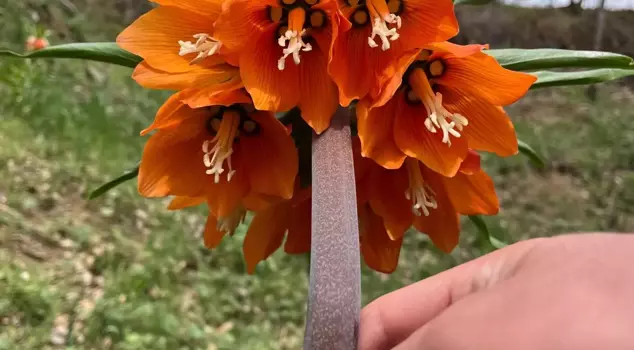
01.04.2025 11:01
In the Arıcak district of Elazığ, the "Crying Bride" tulips, known for being at risk of extinction, are offering a visual feast in high-altitude areas. To protect these endemic flowers, local farmers are trying to ensure their survival by spreading their seeds. Damaging or picking the tulips can result in a hefty fine of 244,315 Turkish lira.
```html
The Arıcak district of Elazığ offers a unique visual feast in spring with the reverse tulips, known among the people as "Weeping Bride" or "Sorrow Flower," which grow in the high-altitude regions of Eastern and Southeastern Anatolia. As the snow begins to melt, the reverse tulips that grow in mountainous areas and high-altitude villages create landscapes that are reminiscent of nature's paintings. This special plant, which blooms for a short period each year, is recognized by the name "Weeping Bride," symbolizing a bride who cannot reunite with her beloved. The visual spectacle of these flowers lasts for about two weeks. The reverse tulips, which are among the beauties of spring, are not only found in natural areas but are also planted in gardens in the high-altitude villages of the Arıcak district for protection. These efforts are of great importance to ensure the survival of the reverse tulips. Reverse tulips can be seen not only in Elazığ but also in provinces such as Tunceli, Bingöl, Diyarbakır, Adıyaman, Hakkari, Van, Şanlıurfa, Şırnak, and Muş. However, those who pick these endemic plants, which can survive only 20 days a year and are at risk of extinction, face a high fine of 244,315 lira.
THE REVERSE TULIPS HAVE A 20-DAY LIFESPAN
Salih Bayar, who stated that the reverse tulips create a visual feast in the gardens of the Saman neighborhood in the Arıcak district, said, "This flower has a 20-day lifespan. Since it coincided with the holiday this year, there are not many visitors. As it is known, this flower, which is under threat of extinction and is a rare species, has very severe penalties for being picked, harmed, or removed from its natural habitat. We have scattered its seeds everywhere to ensure the continuation of our endangered flower's lineage."
```